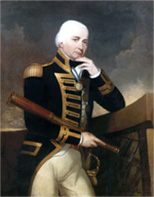Given that it has been in existence since the 16th century, and the important role it has played in the life of the city, the Royal Grammar School, Newcastle, has had its share of distinguished former students (known as Old Novos). Cuthbert Collingwood is one of them.
In truth, Collingwood’s time at the school was probably very brief; the co-editor of the school’s history, Brian Mains, believes it was probably as little as six months (unfortunately the school’s records for this period were lost a long time ago). By the age of 13, Collingwood was at sea. The reason for his brief stay was in all probability the same reason for his attendance in the first place.
Though from a distinguished gentry family, the Collingwoods had no money. John Scott, who as Lord Eldon was Lord Chancellor for twenty years from 1807, recalled that Collingwood and he ‘were class fellows at Newcastle. We were placed at that school because neither his father or mine could afford to place us elsewhere.’
It was a very different institution then, of course, based upon a ‘pure classical foundation’ overseen by the ‘hard but highly capable’ Head, Hugh Moises: ‘Latin was the meat course and salads and desserts were few’.
The success of Collingwood and Scott shines a light on the social and educational history of the RGS. Like similar ancient grammar schools up and down the land, the RGS produced many high-powered and successful people over the centuries. Some, coming from wealthy families, will have given the impression that future success was inevitable given the silver spoon they were born with. Collingwood and Scott may have been ‘gentle born’, but were relatively impoverished.
The RGS of the 18th century had a pretty comprehensive social intake, varying from the sons of clergymen and gentry, to the ‘middling sort’, and sons of craftsmen and even ‘menial servants’ who won their way from truly poor homes into the school and to success beyond. It was for them, above all, that the school was founded, undoubtedly in some form some decades before it was officially endowed and put on a more secure footing by Horsley’s bequest of 1545. It was modestly priced to those who could pay fees, but was free (apparently) to the poor as well as to the sons of Freemen.
For Collingwood, and his financially challenged family, the route to success in life was the Royal Navy. University required substantial funds or, for the few, a scholarship; the army needed the purchase of a commission and private funding beyond that; the law demanded capital too. The Navy offered what amounted to free entry, an education, a career structure and the lure of prize money and glory.
Perhaps we must confess that even the exciting range of extra-curricular opportunities a school like the RGS offers cannot quite match the challenge of being at sea as a midshipman, age a13, on a fully equipped frigate! One wonders what a modern regulatory framework would have made of the dangers and ferocious discipline of such a life, however.
A school such as the RGS is proud of its distinguished Old Novos, ranging from politicians to musicians, architects to academics. To have as one of them a genuine local hero, and one of the great sailors of a nation and region with a great maritime history, is naturally a source of great pride. Collingwood left an indelible mark on European history as admiral, politician and diplomat, playing a pivotal role in saving Europe from Napoleonic domination; many more played perhaps less distinguished, but no less heroic, roles in the defence of freedom in the two world wars.
The school is delighted to be involved in the bi-centennial celebrations. Collingwood maybe have only been with us a short time, though his affection for the area remained intact all his life. Upon news of his death the Newcastle Courant praised a ‘highly distinguished and gallant townsman’, whose ‘services will forever be in the memory of a grateful country’. Those words his old school can happily echo.
Simon Tilbrook, Head of History,
Royal Grammar School, Newcastle upon Tyne.


